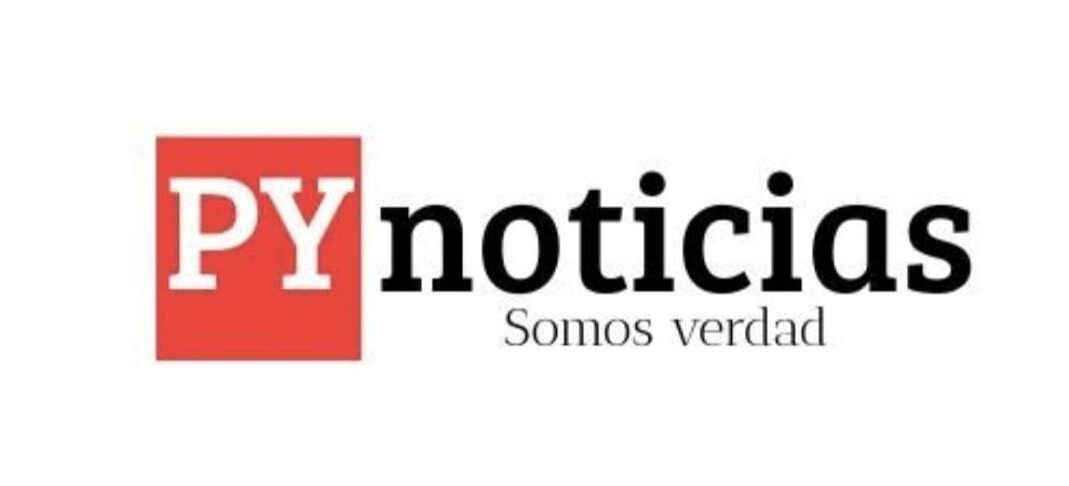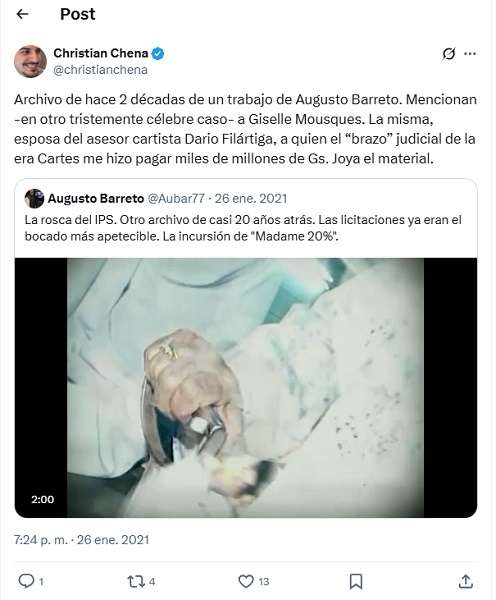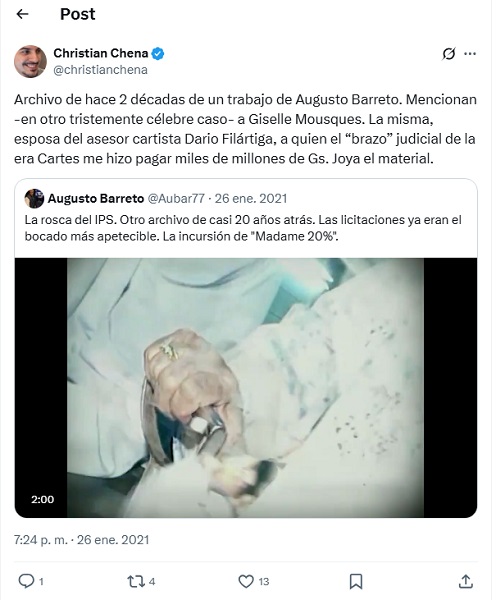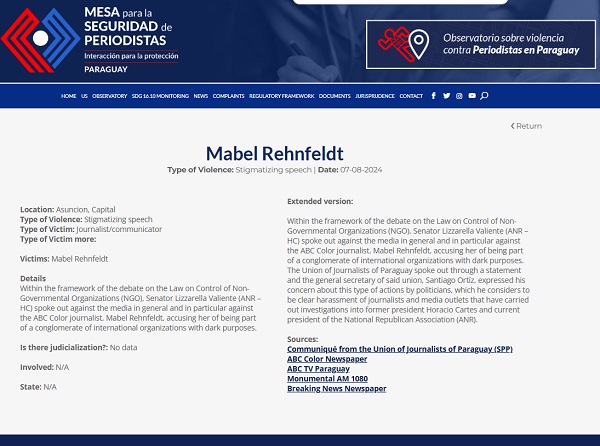The Honor Colorado administration, led by President Santiago Peña, has championed a public discourse of freedom of expression and transparency. Peña’s action of signing the Declaration of Chapultepec in October 2024 and officialist leaders’ criticism of repressive regimes, such as the Cuban one condemned by Bachi Núñez, serve as an international showcase. However, domestically, a growing pattern of censorship and intimidation is evident. This pattern is orchestrated by powerful political and economic figures and executed through the instrumentalization of the judicial system to silence complaints of political corruption.
This contradiction translates into a systematic attack on journalism, where judicialization and informational shielding have become the primary tools to repress the dissemination of critical information throughout the 2023-2025 period.
The Machuca Case: When Retweeting Becomes a Crime
In January 2024, Trinidad Peace Judge Gloria Machuca issued an unprecedented ruling in Paraguay. She ordered businessman Christian Chena and the media outlet RDN to refrain for 365 days from publishing or sharing any information about Gisele Mousques, wife of former IPS director Darío Filártiga, a political advisor to Horacio Cartes and current ambassador to Taiwan. The ruling, based on Law 5.777/16 on Comprehensive Protection of Women, followed the release of a video alleging irregularities at the Social Security Institute.
The ruling’s scope was extraordinary: the judge classified a “retweet” as incitement. She argued that reposting content on social media constituted a “rehash” or “indirect offense.” Attorney Alejandra Peralta Merlo, representing Chena and RDN, challenged this interpretation, noting that retweeting was being equated with instigation without proof.
Follow us on Instagram.
Experts criticized the ruling as an abusive interpretation that conflated protection against violence with prior censorship. It was overturned by First Instance Judge Rosanna Frutos Olguín, who ruled it violated Article 26 of the National Constitution, which prohibits prior censorship, and affirmed the right to disseminate information of public interest.
Mousques appealed to the Supreme Court to annul Frutos’s decision. In response, TEDIC, the Center for Studies on Freedom of Expression and Access to Information (CELE) at the University of Palermo, and the Wikimedia Foundation submitted an amicus curiae to offer technical and legal insight into the misuse of Law 5777/16, which led to judicial restrictions against Chena, and RDN.
Institutional Shielding and Judicial Paralysis
In August 2024, the Magistrates’ Disciplinary Board (JEM) acquitted Machuca without reviewing the case’s merits, shelving accusations of misconduct and bias. This prompted Peralta Merlo to file a constitutional action in February 2025, warning that the judge’s impunity set a dangerous precedent.
JEM filed charges against judge who found Chena guilty of violence against women
After eight months of procedural inactivity, in October 2025 the defense filed a third request urging the Court to act. The motion argued that the prolonged silence amounted to a denial of justice, undermining the right to information and eroding trust in the judiciary’s independence.
The Machuca case has become emblematic of institutionalized censorship via the courts, where laws meant to protect against violence are repurposed to silence public criticism. The central question remains: to what extent can the judiciary restrict freedom of expression under the guise of protecting individual rights? For legal experts, journalists, and human rights organizations, the answer will define Paraguay’s democratic standards in the years ahead.
Violation of Source Confidentiality: A Blow to Investigative Journalism
In August 2023, at the start of Peña’s administration, one of the most serious breaches of journalistic source confidentiality occurred—an essential right protected by Article 29 of the National Constitution. Prosecutors Aldo Cantero, Rodrigo Estigarribia, and Daniela Benítez ordered ABC Color and Última Hora to disclose the names of journalists who had written articles about former President Horacio Cartes, who claimed he was being persecuted.
Prosecutors insist on identifying journalists for articles linked to Cartes
This demand aimed not only to identify informants but also to foster self-censorship, deterring journalists and sources from investigating sensitive topics due to fear of legal or personal repercussions.
Stigmatization: Discrediting as a Political Weapon
In September 2024, during legislative debates on NGO regulation, several political actors launched a stigmatization campaign against critical journalists. They circulated personal data about alleged contracts or employment ties between reporters and organizations, implying a lack of objectivity and independence.
Such stigmatization erodes professional reputations, undermines public credibility, and seeks to delegitimize criticism or investigative work. By casting doubt on journalists’ integrity, the aim is to neutralize scrutiny of those in power.
Legal Injunctions as Indirect Censorship: The Guachiré Case
Legal injunctions, originally designed to protect fundamental rights, have become tools of indirect censorship. Journalist Alfredo Guachiré has faced multiple injunctions aimed at blocking his investigations. Most recently, former President Horacio Cartes and his family filed an injunction accepted by Judge Marcelo Tomás Rocholl, ordering the Ministry of Economy and Finance not to disclose any financial or corporate information related to them.
The action, filed by attorney Pedro Ovelar, responded to Guachiré’s request for access to information about the Cartes family’s corporate holdings. The strategy is clear: delay proceedings, exhaust the requester, and prevent the release of compromising data—distorting the purpose of injunctions to restrict access to public information.
Physical Attacks: The Escalation of Violence
Censorship extends beyond legal and political realms, manifesting in physical attacks against media workers. The International Federation of Journalists (IFJ) and the Paraguayan Journalists’ Union (SPP) have reported ongoing assaults, threats, and attacks.
In recent weeks, at least three armed attacks targeted journalists, damaging homes and vehicles in both metropolitan and rural areas. Incidents include attacks on congressional reporters, gunfire at a journalist’s home from El Observador, and a Molotov cocktail attack on a PDS Digital journalist. Additionally, Cartes-affiliated councilwoman Carolina González de Árevalo filed a gender violence complaint against Lambaré’s municipal press chief after his home was shot at.
The Urgent Need for a Journalist Protection Law
The judicial targeting of the press between 2023 and 2025, combined with physical violence and judicial inaction, reveals a systematic threat to press freedom in Paraguay. Strategic litigation drains resources from investigative journalism and redirects them toward legal defense.
These attacks have reignited calls for Congress to pass the long-delayed Law for the Protection of Journalists and Human Rights Defenders. Its stagnation highlights the lack of political will to ensure the safety of those who uphold the fundamental right to inform and be informed. Paraguay’s democracy is being tested: the gap between the rhetoric of freedom and the reality of censorship continues to widen.
El artículo en español aquí.



